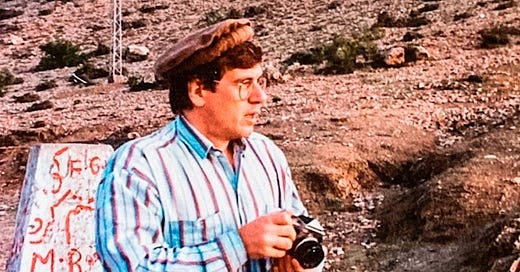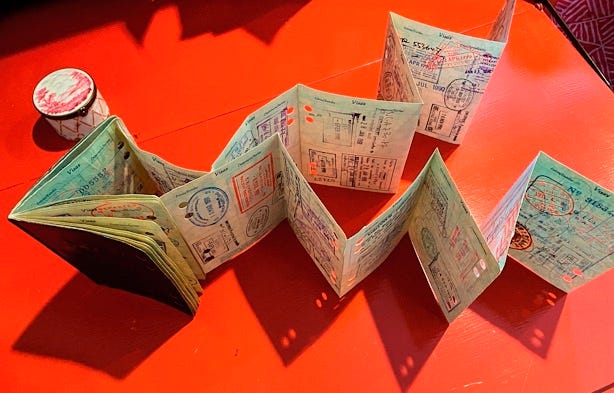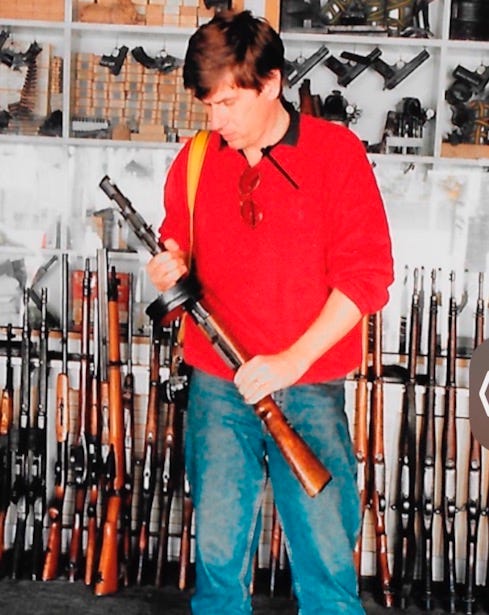(in the Khyber Pass)
The old Reuters News Agency office in Manhattan was in a building across the street from the Ed Sullivan Theater. It was a perfect location, half a mile north of The New York Times, where my wife worked.
It was maybe a five-minute walk to a kiosk where we could buy same-day half-price tickets to the best of Broadway, so a couple of evenings a week you could find us seeing “Amadeus” or “Moon for the Misbegotten” or “A Little Night Music,” practically for free.
Once, I got tickets to see Al Pacino off-Broadway in a David Mamet play. We were in the second row because the front row was sold out. That turned out to be okay because Pacino spits when he delivers his lines, so unlike the poor saps right in front of us, we went home fairly dry. We had seen a good play, and the first row had seen, literally, the spitting image of Al Pacino.
I had been with Reuters for a few years, and although they have reporting bureaus scattered all over the world, this was the only one I had ever seen. Barbara and I were two ambitious young journalists, kind of stuck in New York. If you have to be stuck somewhere that’s a pretty good place for it, yet we dreamed of getting paid to roam the world.
One afternoon, I saw this guy get off the elevator and he must have been okay, because Madge, the receptionist with the grating voice, who lived in an apartment building once occupied by Gustav Mahler, buzzed him into the newsroom.
He was wearing the Reuters uniform. Khakis, Oxford button-down shirt, regimental tie and blue blazer, which I guess explained why Madge didn’t stop him. Jack the Ripper himself could get buzzed into a Reuters office if he had a blue blazer with nice pewter buttons.
“Excuse me, is Mike working today?” the guy politely asked me.
“Which Mike? We’ve got six of them. Mike Rhea, Mike Clancy, Mike Hughes…”
“That’s the one, Mike Hughes. I was hoping to see him. We used to work together in the Nairobi bureau…”
Right there. In that precise instant, I knew that I wanted to be a guy who was being sought by an old colleague from many years ago and countless miles away, to trade memories of Nairobi, Rio de Janeiro, Shanghai… It didn’t matter where, as long as it was far-flung and oozed color, and we could reminisce about our time there.
Beers, fried food and memories of shenanigans in old Bangkok.
And oh, what a place that was, back in the day.
Alas, because of the stuck-in-New-York situation I already mentioned, I seemed destined to just be the guy who gets asked about the work schedule of the colleague who was once in Nairobi.
Then, an unforeseen thing happened. In 1984, our son was born. No, that wasn’t what was unforeseen, we did see that one coming. But Barbara took a full year off from her job, and when she finally went back, she was not happy. She didn’t want to be the Times reporter scooping her way onto the front page. She wanted to be the mother, watching her son grow up. Who could blame her?
She ambushed me. “You know how Reuters is always asking if they can post you somewhere?” she said one autumn day in 1986. “Tell them yes, they can.”
This was beyond shocking. “Are you sure about this?”
“Absolutely.”
I think she was picturing a nice posting to London, pushing a pram around Hampstead Heath. Instead, early in 1987 we found ourselves winging our way to Hong Kong, where we would spend eight years.
Barbara’s resignation from The Times was only partly successful. They tracked her down nine months later and paid her very handsomely to be their part-time correspondent in Hong Kong. She was able to work mostly from home and spend far more quality time with young Christopher than she ever could have done in New York, so it was win-win.
In a conversation I truly wish I could have heard personally, a British foreign correspondent asked the Reuters bureau chief, “Have you had a chance to meet the New York Times’ new man in Hong Kong?”
“Yes, I have,” the Reuters bloke replied. “The New York Times’ new man in Hong Kong is a woman.”
But this story isn’t about ingrained sexism, it’s about the air of romance that is, for me, inseparable from being someplace very special, someplace hard to get to, someplace reeking with history, someplace worth remembering.
It must be pointed out that much of colonial legacy is deeply shameful. That reality didn’t keep me from getting goosebumps on walking through the doors of the Raffles Hotel, in Singapore. Joseph Conrad, Somerset Maugham and Noel Coward all stayed there. The hotel’s Long Bar was the birthplace of the Singapore Sling, by the way, and I’ve sampled a few there.
I got that same feeling upon staying at the Strand Hotel, in Rangoon, Burma. Rangoon is today called Yangon, and Burma is Myanmar. The Strand Hotel is still the Strand Hotel, but it has been tarted up as a shiny five-star destination, and the rats that shared my room with me are probably long gone.
Early one morning in Rangoon I took my camera to a street where barbers offered their services in outdoor chairs. I took a photo of a barber scraping foamy stubble off a customer’s chin with a straight razor and moved it on our photo feed under the caption, “Burma Shave.”
Yes, I really did that. If you are under a certain age, you may want to Google the reference, or maybe just ignore it. It’s your call.
If you share the notion that travel is romantic, the most alluring spot on this earth may be a 33-mile-long stretch of dusty road called the Khyber Pass. Alexander the Great’s army marched there. So did Genghis Khan’s. It was pivotal to the bustling Silk Road trade. How romantic was it? It was Rudyard Kipling romantic.
They don’t make it easy to get there. Our trip began with a 4:30 a.m. hotel pickup in Peshawar, Pakistan, by armed escorts who rode with us through the Pass. We stayed for several hours at a refugee camp in Jalalabad, to conduct some interviews, and then went back through the Pass to Peshawar.
My Peshawar hotel was home to what was back then the only legal bar in all of Pakistan. I ventured down for a cocktail, saw a no-nonsense sign over the door saying, “Only Non-Muslim Foreigners Allowed,” observed how deeply sad and lonely the few patrons appeared, and I didn’t even go in.
The problem with wanting to be somewhere remote and exotic is that, as the old song laments, kicks just keep getting harder to find.
We had been to the Great Wall of China, but they opened a new section, so we went back. I had been to Panmunjom, site of the Demilitarized Zone that separates South Korea from North Korea. But I was happy to go back, this time with Vice President Dan Quayle to cover his official visit.
I got tired of the hotel food in Rangoon, where I was trying to open a Reuters bureau. I had heard about a fourth-floor walkup that specialized in grilling snake meat on the roof. I went, but I had the salad, instead.
(My passport, with visas)
The exotic destinations stacked up like well-shuffled playing cards, filling my passport with so many visas that I had to have extra pages added, several times. Cambodia, Bangladesh, Mongolia, Lebanon, Vietnam…
The most other-worldly, impossibly remote place I visited as a working journalist would have to be Darra Adam Khel, a dusty town in Pakistan’s wild and wooly North West Frontier Province. It had one main street and a number of side alleyways, and nearly every shop there either made guns or sold guns.
These weapons were known in the business as “Khyber Pass Copies.”
You needed special credentials just to enter the tribal North West Frontier. Darra was a monument to man’s inhumanity to man. You could buy working knockoffs of any firearm you wanted – American, Russian, Chinese, M-16s, Kalashnikovs, and ammunition for all of them, assembled by children in the alleys, putting deadly bullets together with pliers and hammers. Not a damn thing romantic about that, I can tell you.
(Checking out the weapons in Darra Adam Khel)
Periodically, the rat-a-tat of fully automatic gunfire punctuated the afternoon, as customers tested the products in the middle of the street.
Folks gathered outside one shop as a potential buyer test-fired a rocket-propelled grenade. A shopkeeper told me one of those RPGs had taken out a hiker in the mountains a few weeks ago, so now they were trying to be more careful. Whew.
So, my wish came true, to be that guy who gets to reminisce.
Recently, a dear friend from my old Reuters days came to visit us in our new home. We ate, drank, talked, and laughed. We exchanged those stories that are so deeply rooted in our shared history that with the first couple of words, we both knew where things were going, but we told them anyway. We cracked ourselves up until Bourbon cascaded from our noses.
Do you know where the two of us met, three decades ago? We worked together in old Hong Kong.
And oh, what a place that was, back in the day.







What a story..and not a story, as this was your life back in the day. I loved every word and will read this again.
Your friend by my sister association, Johanna.
Btw, the nickname Joie is reserved for siblings only. I out grew it years ago and don’t want you to be my long lost brother. This correction is sent to you with utmost respect and acknowledgement that you want accuracy. Keep the stories coming, I love every one
Knew about Hong King but am blown away by all the other travels. Wonderful story.